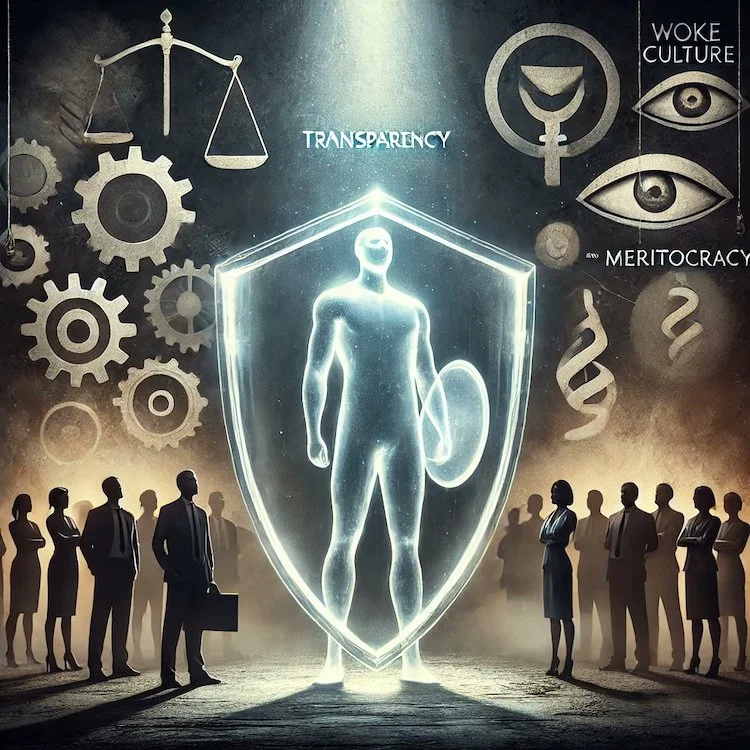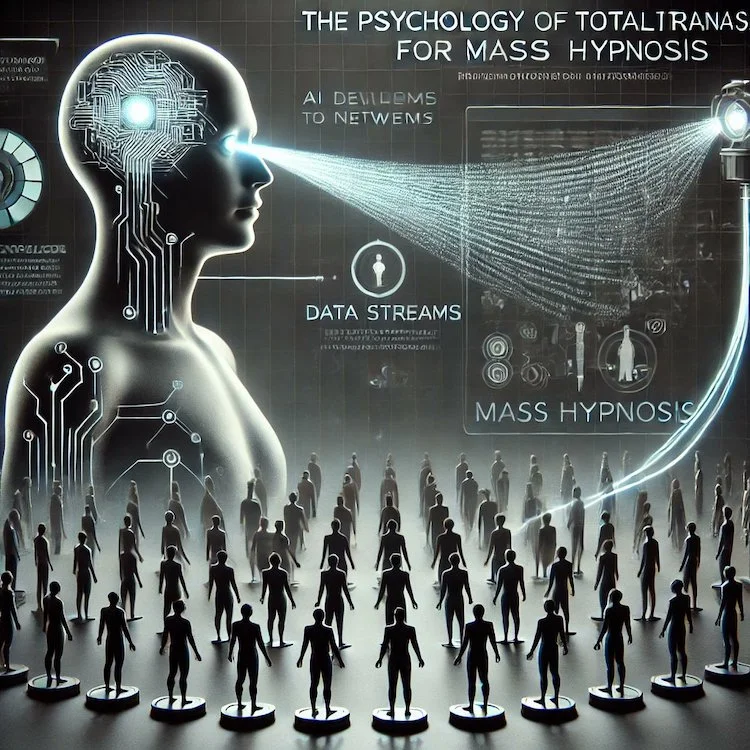Introduction
The interplay between transparency and secrecy in professional and public discourse is critical in shaping societal norms, individual behaviour, and the integrity of public debate. This essay explores the complexities of online cancellation, professional cancellation, and corporate secrecy, examining their impact on fostering a resilient, efficient and inclusive society. Additionally, it delves into the role of ethical standards in information sharing, the dangers of network-driven media influence, and the essential protection of diverse voices against manipulation.
1. Online Cancellation and Freedom of Speech
The phenomenon of online cancellation has become increasingly prevalent, where individuals face backlash and censorship for expressing political views on social media platforms like Facebook. This issue can be linked to the concept of “mass formation” as explored by Mattias Desmet in “The Psychology of Totalitarianism.” Desmet explains how repeated exposure to similar messages can lead to a collective mental state akin to hypnosis, where individuals unconsciously accept and internalize propagated narratives.
This process is exacerbated when people with malicious intent use of platforms like Business Wire, which can disseminate “mass delusion media packages” across 100 000+ of media outlets simultaneously. These packages, often containing uniform or slightly varied messages, create a network effect where information is cross-referenced and self-substantiates itself to the audience as the audience receives multiple “mass delusion media packages” through multiple channels across various types of networks (virtual, professional, public, government and family). This multi-directional input can overwhelm an individual’s critical thinking faculties, especially when information is delivered consistently from both trusted and untrusted sources. (The trusted sources is a tactic of espionage and foreign influence, and it can immediately bypass the defenses of the unsuspecting victims to plant information within a family member). The result is a suppression of diverse viewpoints, stifling free speech and preventing meaningful public discourse.
2. Professional Cancellation and Workplace Information Sharing
In the corporate environment, professional cancellation occurs when employees are penalized for sharing certain viewpoints or sensitive information. This issue is compounded by corporate cultures that prioritize conformity over diversity of thought. The pressure to align with a company’s public stance can lead to a climate of self-censorship, where employees fear repercussions for expressing dissenting opinions.
Moreover, the weaponization of sensitive information by work colleagues that one competes with, gathered through unethical means, such as off-the-record meetings (that they seem to push everyone to do to get that sensitive information), can be used and is usually used to undermine colleagues (especially those of high talent, high competence, high capability, high potential, high moral character, high human centrist orientation, high visionary forward looking approach). This practice is not only unethical but also detrimental to a healthy, efficient and workplace environment, one that is based on reason and principles of growth and advancement. It creates an atmosphere where fear and conformity prevail over innovation and genuine competition. Managers must recognize the ethical implications of such behaviours and strive to foster an environment where open dialogue, transparent dialogue and diverse perspectives are encouraged, instead of having the “weaponization of ethics” encouraged to defeat talent by invalidation process (a loophole used by woke followers and the two book method), rather than work performance process.
3. Corporate Secrecy and the Skills Gap
Corporate secrecy significantly contributes to the skills gap, particularly in technologically advanced economies like Canada. When corporations withhold critical information about required skills, insider work templates, task templates about what the roles are done at the company and in what procedures and steps, and job processes, they create barriers that prevent aspiring professionals from aligning their education, career paths, career experience development with market demands. This lack of transparency about job tasks operations sequences, stifles the development of a skilled and adaptable workforce, essential for meeting future challenges and essential for responding to interview questions with the needs of the corporations. A self defeating approach to create interviews that will automatically fail by hiding the information needed by the interviewer to pass.
The deliberate use of secrecy can also be a strategic move to maintain control over the workforce, limiting opportunities for employee advancement and innovation. This strategy, while potentially beneficial in the short term for maintaining market dominance, ultimately harms the broader economy by preventing the free flow of information necessary for a dynamic and evolving labour market.
4. Implications for Civilization Development
The balance between transparency and secrecy extends beyond individual and corporate spheres, impacting broader civilization development.
A culture of openness fosters innovation, critical thinking, and collaborative problem-solving — essential components for societal advancement. Conversely, environments dominated by secrecy and fear of retribution become stagnant and risk-averse, stifling groundbreaking ideas and advancements. This dynamic is evident in various sectors, including government and large corporations, where lack of transparency can lead to inefficiencies and a lack of accountability.
‘Transparency is our greatest tool for building a united society, one that can overcome the challenges posed by woke culture. This culture has undermined meritocracy through the administrative invalidation and weaponization of ethics, targeting the most talented and high-performing workers in the economy, leading America and Canada towards collapse scenarios that we are in today’.
5. The Role of Ethical Standards in Information Sharing
Establishing robust ethical standards for information sharing is crucial for balancing confidentiality with the public’s right to know. This balance helps prevent the misuse of power by those in control of sensitive information, whether within corporations or among employees. The example of Business Wire’s capability towards dissemination of coordinated network delivered messaging highlights the need for ethical oversight to prevent the spread of misleading or manipulative information.
Managers must be vigilant against the “weaponization of ethics,” where ethical standards are misused to undermine competent individuals for personal gain.
6. Empowering the Next Generation
Prioritizing transparency is essential for empowering the next generation of professionals with the skills and knowledge necessary to contribute meaningfully to society. This empowerment goes beyond job preparation, equipping individuals to tackle global challenges such as climate change, resource scarcity, economic national debt collapse/currency collapse, infrastructure collapse, and socio-economic disparities. A transparent environment fosters critical thinking, continuous learning, and adaptability — qualities that are indispensable for innovation and progress.
7. Creating a Resilient and Inclusive Society and Individuality Respecting Society
Transparency and open communication are foundational to building a resilient and inclusive society that respects individuality. This approach encourages the expression of diverse perspectives and experiences, fostering a culture of respect and understanding. It ensures that all voices are heard, promoting equality and reducing the risks associated with echo chambers and groupthink.
In today’s media landscape, the ability to purchase “mass media delusion packages” exemplifies how networked media systems can be used to manipulate public consciousness and to hypnotize groups in society. By delivering coordinated messages to a vast network of outlets, these packages can induce a state of “mass formation,“ where collective belief systems are subtly altered. The concept of “mass formation“ is crucial in understanding how repeated messaging, especially through networked systems, can influence public perception and behaviour.
Understanding the science behind media influence and cognitive processing is essential in recognizing the need to protect diverse voices. The brain’s receptivity to repeated messaging can lead to the acceptance of manipulated information, especially when individuals are in a more suggestible state. This underscores the importance of fostering critical thinking and media literacy, enabling individuals to navigate the complex media landscape and resist manipulation.
Even amidst widespread media influence, some individuals exhibit resilience and resistance to these tactics. This resilience often stems from a strong foundation in critical thinking, a healthy skepticism towards media sources, and an awareness of cognitive biases. These individuals, through their ability to maintain independent thought, provide invaluable counter-narratives that disrupt corporate-driven groupthink.
‘Think of individuals with high resiliency to hypnosis, as crucial individual public safety officers, that instead of being cancelled, they can restore the health function of group systems of humans should they be hypnotized by a technology system.”
As our society increasingly integrates into networked human systems, both technologically and socially, and “more and more imitates the P2P nature of the internet” rather than autonomous, sovereign and independent units of sentient operation, recognizing the importance of individual voices is essential critical and invaluable. These voices not only maintain a diversity of thought, critical to preservation of independent human will, but also safeguard the integrity of our communication networks.
“The shift towards a peer-to-peer-like structure in human interactions, facilitated by the internet and social media, amplifies the need to protect these unique perspectives.”
Conclusion
In conclusion, the delicate balance between transparency and secrecy plays a pivotal role in shaping professional and public discourse. While transparency fosters a culture of innovation, critical thinking, and inclusivity, excessive secrecy can lead to stagnation and the suppression of diverse viewpoints. The science of media influence and cognitive processing highlights the importance of protecting individual voices and promoting ethical standards in information sharing.
By fostering an environment that values and protects individual expression, we can safeguard against the dangers of “hypnosis warfare” and “maintain a resilient societal structure”.This approach ensures that our journey towards a more interconnected humanity does not compromise the richness of diverse thought, of independent thought (as woke practitioners tried to subvert individuality through this cancel culture) and the critical analysis necessary for true progress and the continued evolution of our civilization.
Related Content:
Title:“The skills gap is a phenomenon that has been observed in many economies worldwide, where employers struggle to find workers with the skills they require, while at the same time, many unemployed individuals struggle to find work. This mismatch between the skills employers need and the skills available in the workforce is referred to as the skills gap.” https://skillsgaptrainer.com/











To see our Donate Page, click https://skillsgaptrainer.com/donate
To see our YouTube Channel, click https://www.youtube.com/@skillsgaptrainer